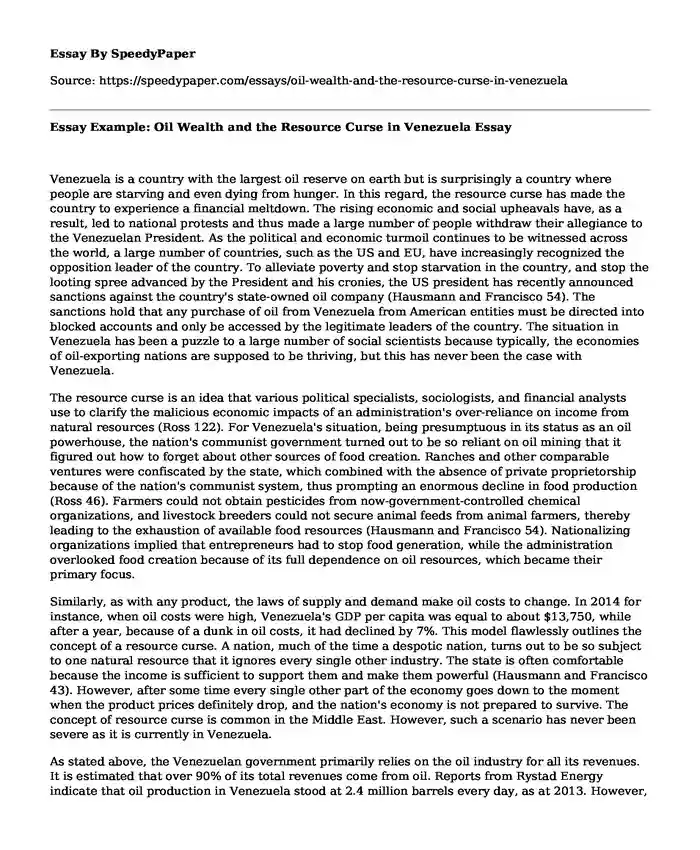Venezuela is a country with the largest oil reserve on earth but is surprisingly a country where people are starving and even dying from hunger. In this regard, the resource curse has made the country to experience a financial meltdown. The rising economic and social upheavals have, as a result, led to national protests and thus made a large number of people withdraw their allegiance to the Venezuelan President. As the political and economic turmoil continues to be witnessed across the world, a large number of countries, such as the US and EU, have increasingly recognized the opposition leader of the country. To alleviate poverty and stop starvation in the country, and stop the looting spree advanced by the President and his cronies, the US president has recently announced sanctions against the country's state-owned oil company (Hausmann and Francisco 54). The sanctions hold that any purchase of oil from Venezuela from American entities must be directed into blocked accounts and only be accessed by the legitimate leaders of the country. The situation in Venezuela has been a puzzle to a large number of social scientists because typically, the economies of oil-exporting nations are supposed to be thriving, but this has never been the case with Venezuela.
The resource curse is an idea that various political specialists, sociologists, and financial analysts use to clarify the malicious economic impacts of an administration's over-reliance on income from natural resources (Ross 122). For Venezuela's situation, being presumptuous in its status as an oil powerhouse, the nation's communist government turned out to be so reliant on oil mining that it figured out how to forget about other sources of food creation. Ranches and other comparable ventures were confiscated by the state, which combined with the absence of private proprietorship because of the nation's communist system, thus prompting an enormous decline in food production (Ross 46). Farmers could not obtain pesticides from now-government-controlled chemical organizations, and livestock breeders could not secure animal feeds from animal farmers, thereby leading to the exhaustion of available food resources (Hausmann and Francisco 54). Nationalizing organizations implied that entrepreneurs had to stop food generation, while the administration overlooked food creation because of its full dependence on oil resources, which became their primary focus.
Similarly, as with any product, the laws of supply and demand make oil costs to change. In 2014 for instance, when oil costs were high, Venezuela's GDP per capita was equal to about $13,750, while after a year, because of a dunk in oil costs, it had declined by 7%. This model flawlessly outlines the concept of a resource curse. A nation, much of the time a despotic nation, turns out to be so subject to one natural resource that it ignores every single other industry. The state is often comfortable because the income is sufficient to support them and make them powerful (Hausmann and Francisco 43). However, after some time every single other part of the economy goes down to the moment when the product prices definitely drop, and the nation's economy is not prepared to survive. The concept of resource curse is common in the Middle East. However, such a scenario has never been severe as it is currently in Venezuela.
As stated above, the Venezuelan government primarily relies on the oil industry for all its revenues. It is estimated that over 90% of its total revenues come from oil. Reports from Rystad Energy indicate that oil production in Venezuela stood at 2.4 million barrels every day, as at 2013. However, oil production has been declining significantly in the recent past, even without the recent sanctions by the United States. It is anticipated that oil production has declined considerably due to a lack of investment. It means that the latest sanctions by the US are only like adding salt to an injury (Hausmann and Francisco 54). Even as much as the objective of introducing the sanctions is to ensure that oil revenues reach the ordinary people, the sanctions have been confirmed to be quite disastrous to the country's economy. It should be noted that some years back, Venezuela used to be the fourth biggest oil importer in the United States while the United States used to be its biggest customer (Ross 32). As a result, the sanctions have brought a scenario where Venezuela is struggling to win new customers the Gulf Coast refineries of the United States is seeking for alternative sources of crude oil that was initially supplied by Venezuela.
However, hope is not lost because some experts have predicted that the impact of the sanction may not be as serious because Venezuela can divert its oil exports to other countries even when it will have to sell the supply at relatively lower prices. Countries such as China and India will have to pick up these oil supplies at great discounts. Given that the country exports about 450, 000 oil barrels to the US on a daily basis, it means that the sanction will see new oil products from Venezuela find their new way and flood other markets.
Works Cited
Hausmann, Ricardo, and Francisco Rodriguez. Venezuela Before Chavez: Anatomy of an Economic Collapse. , 2014. Internet resource.
Ross, Michael L. Oil Curse - How Petroleum Wealth Shapes the Development of Nations. , 2013. Print.
Cite this page
Essay Example: Oil Wealth and the Resource Curse in Venezuela. (2023, Mar 07). Retrieved from https://speedypaper.com/essays/oil-wealth-and-the-resource-curse-in-venezuela
Request Removal
If you are the original author of this essay and no longer wish to have it published on the SpeedyPaper website, please click below to request its removal:
- Guide to Being a Good Student, Free Essay
- Free Essay Discussing the Issue of World Overpopulation
- Franz Schubert and the Peacocks of Benvenuto Cellini - Article Analysis Essay Sample
- Free Essay Sample on Value Systems
- Free Essay: A Nonprofit Tries to Cope With Image Destruction
- Paper Example. Acute Otitis Media Infection
- Use of International Law - Paper Example
Popular categories





